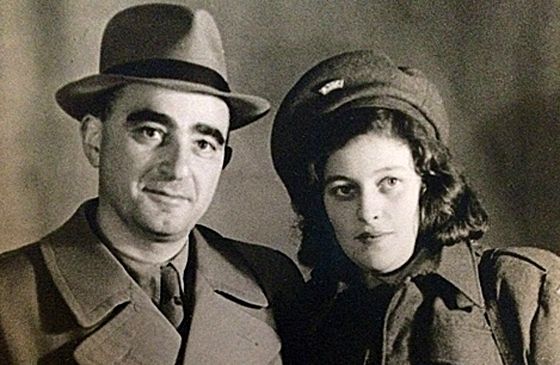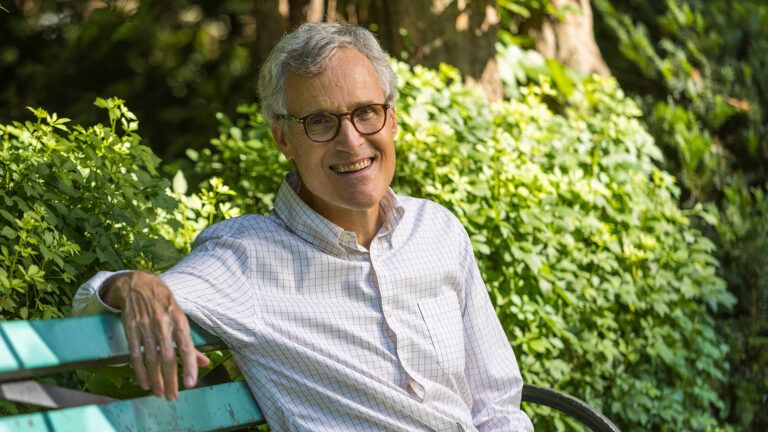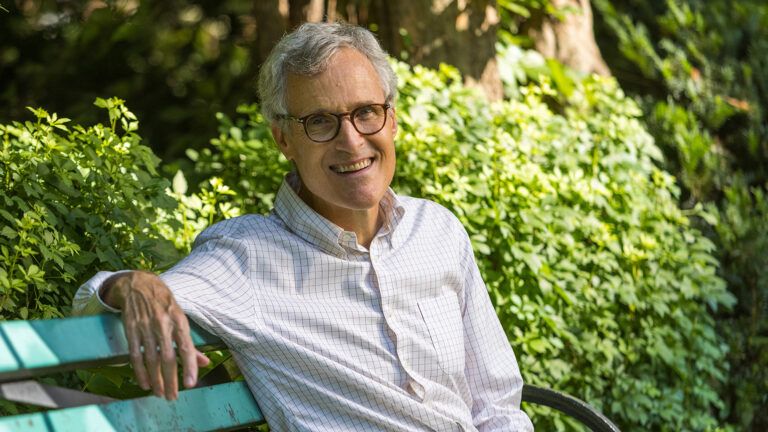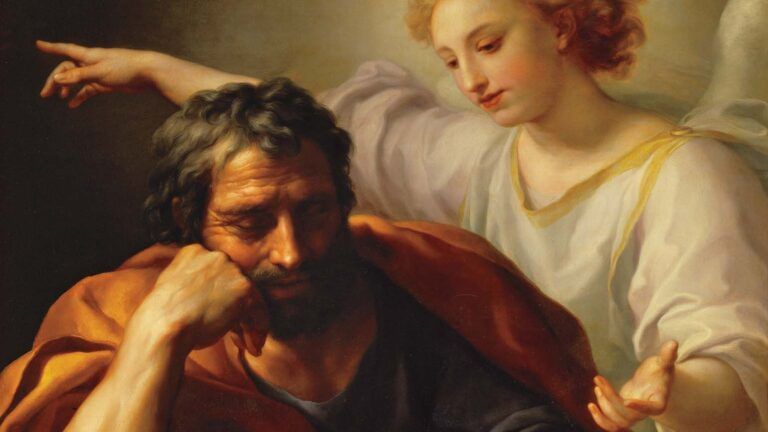My grandmother, Oma, isn’t one to sit still, especially on my wedding day. She walked down the aisle, said the blessing over the challah, and stayed on her feet dancing and chatting with family and friends nearly the entire night. Few frames of our wedding video are without her in them.
That’s the woman I’ve looked up to all my life–someone who lives to the fullest, who delights in every simcha, or special occasion, who can’t contain her joy when playing with her six-year-old twin great-grandsons, eating a sweet piece of marzipan, schmoozing with the rabbi after Saturday morning services at the synagogue she helped build–the place where my husband and I were married.
It’s easy to forget how close everything came to never happening at all.
FOR MORE INSPIRING STORIES, SUBSCRIBE TO MYSTERIOUS WAYS!
Oma is a survivor, one of those fortunate few Jews who outlived Hitler and the Holocaust. Opa, my grandfather, was too. The wedding of Nahum and Miriam Girschowitz came under far different circumstances than mine, in the Kovno Ghetto of Lithuania.
“We dated for only two weeks,” Oma told me. “We didn’t know how much time we had left.” It wasn’t long before they believed their time had run out. In July of 1944, the Nazis liquidated the ghetto.
My grandmother, her husband and her father were crammed together with the other remaining Jews in a cattle car without food or water for days. Finally, they reached Stutthof, a concentration camp in northern Poland.
The Nazi guards forced the women and children to disembark. The men stayed on as the train turned south, headed for Germany and the Dachau camp. My grandparents didn’t expect to see each other alive again.
My grandfather and his father-in-law were liberated by American soldiers from Dachau shortly before the end of the war in Europe. They began working at a hospital for Holocaust survivors in a nearby town, helping the refugees who straggled in daily, bringing stories of unimaginable suffering and loss.
They were not from the area but from far-flung towns across Europe, Jewish communities that had been all but exterminated by the Nazis.
With each new arrival, the refugees hoped to hear of a loved one who’d survived, news of a friend or relative who had somehow not been lost, asking, “Did you know…?” “Have you seen…?”
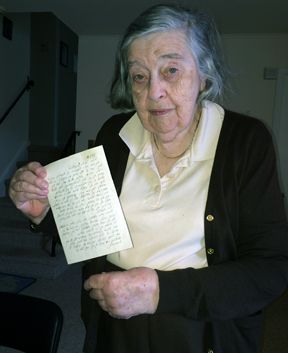 In late July 1945, on a Friday just before the beginning of the Sabbath, my grandfather received a letter with the news he’d been dreading. “I have unfortunately sad news about your wife,” a friend wrote. “She died from typhoid in Stutthof.” Exactly when, the man didn’t know.
In late July 1945, on a Friday just before the beginning of the Sabbath, my grandfather received a letter with the news he’d been dreading. “I have unfortunately sad news about your wife,” a friend wrote. “She died from typhoid in Stutthof.” Exactly when, the man didn’t know.
“I don’t have enough words of consolation for you. This is our people’s destiny, we have to drink from the cup ’til the last drop. We know very well how close we came to the bottom….”
For my grandfather and great-grandfather, the letter was as official as a death certificate.
The two men had been planning to drive all throughout Eastern Europe to find Oma. With the Allies dividing up Germany and millions of refugees scattered across the continent, they knew it would be a difficult, if not impossible, task, but they’d traded tobacco and other things for an old car in preparation.
Now, instead, they prepared to mourn her death. Word went out to the other survivors to gather a minyan, a group of at least 10 Jewish men, the number required to say Kaddish, the prayer of mourning.
But Oma wasn’t dead.
In the winter of 1944, with the Russian Army closing in, Stutthof’s Nazi guards had marched a group of female prisoners into the woods. The women slept at night on the snowy ground, exposed to the elements. Russian planes flew overhead, and the women prayed to be bombed. They’d given up hope.
“We wanted it over with already, an end to our suffering,” Oma told me. In the middle of the night on January 23, 1945, the women awoke to find that their captors had fled. A man on a white horse rode into the clearing. A Russian soldier.
“The women, they called him Moshiach, Moshiach, because it is said the Messiah will come in on a white horse,” Oma said.
The Russian soldiers took the women with them to an army hospital in a small Polish town. Food was scarce, even for the Russians, but at least Oma was under a roof where it was warm, free from the Nazi abuse. After V-E Day, in May, the women were told they could go home.
What home? The Jewish community in Lithuania, where Oma grew up, was no more. The Kovno Ghetto had been burned to the ground. Some family members had left for Israel and France before the war. Were they still alive? What about her father and her beloved husband, Nahum?
Oma bonded with some other survivors, a single woman and a woman with a teenage daughter. Together they snuck aboard a train headed toward Lithuania. On the train platform of a small town, they heard two soldiers quietly asking people if they were Jewish.
“We are,” Oma whispered.
The soldiers were Jewish too. They asked Oma and her group where they were going. “Do you know anyone who is alive there?” they asked. Oma admitted she didn’t.
“Don’t go there, then,” one of the soldiers said. “Russia has a very big door in, but a very small door out. Go to Lublin, southwest of here, a bigger town in Poland. Maybe you will find someone you know.”
The Jewish survivors in Lublin had turned the town’s desecrated synagogue into a community center. As elsewhere, new arrivals brought stories of sadness and stories of hope.
There, Oma and her group stayed. They were given spools of thread to sell in the market for food. Then one day, a new group of refugees arrived. One man approached Oma.
“My God, Miriam, is that you?”
Oma barely recognized him. Someone who had once worked with her father. He was on his way east hoping to find his daughter. “I come from the American zone in Germany, near Munich,” the man said. “Your husband is there, your father too.”
“Once I knew they were alive, I became alive,” Oma told me.
The women vowed to head to Munich. But how?
There were no train schedules, no maps to guide them–they hopped from train to train, drinking water intended for the steam engines, begging for scraps of food, relying on conductors and soldiers to turn a blind eye, always heading west, hoping they were getting closer.
The journey to Berlin, Germany’s divided capital, took nearly five weeks. Once there, they needed permission from each of the Allied powers to enter the American zone. Getting past the Russian border wouldn’t be easy.
The women decided to say they were from Munich and were heading home. Oma hoped the officials would believe them.
Meanwhile, in a little town outside Munich, refugees gathered in Nahum’s apartment to say the prayers for the dead. A friend of my grandfather’s just happened to pull up in a car, returning from a trip.
“Who are they mourning?” he asked a group headed up the stairs to the apartment.
“Miriam Girschowitz.”
My grandfather’s friend rushed up ahead of them. “Stop!” he cried out. “Miriam, she’s not dead!” He’d met someone on his travels who’d told him she had been liberated by the Russians.
My grandfather and my great-grandfather didn’t know what to believe. Could they trust this news? What about the letter? All they could do was wait, and hope.
A few days later, a coal train arrived in Munich. Off hopped three scraggly, soot-covered women and a teenage girl. The first women to arrive in town from the Russian zone. A crowd gathered around.
“I was in a man’s smoking jacket, wearing two different shoes on my feet and covered in coal. I must have looked like a clown,” Oma said. A family friend, Jankel Lewin, was there. “Miriam,” he said. “You were supposed to be dead.”
“I told him I was in the sky, but I didn’t like it there, so I came back,” Oma told me.
The next morning, August 13–her birthday–my grandfather, my Opa, was awakened just after curfew lifted by a knock at his bedroom door. It was his friend Jankel. “Why are you here so early?” Opa asked, rubbing the sleep from his eyes.
“We were passing by,” Jankel said. “So we figured we’d stop here for breakfast.”
Opa opened up the door, and there was Oma, staring back at him. Against almost inconceivable odds and unbearable hardship, they had found each other again. Together, they went to the hospital to reunite Oma with her father.
My grandparents kept heading west, to America. It was a struggle to build a life here as new immigrants, but after what they’d gone through, they embraced the challenge.
My family celebrated Oma’s ninetieth birthday last year. Another simcha. Another blessing that nearly wasn’t. And many more ahead of us.
Learn about Yom HaShoah (Holocaust Remembrance Day) and watch as Oma recalls her experiences in the Kovno ghetto.
